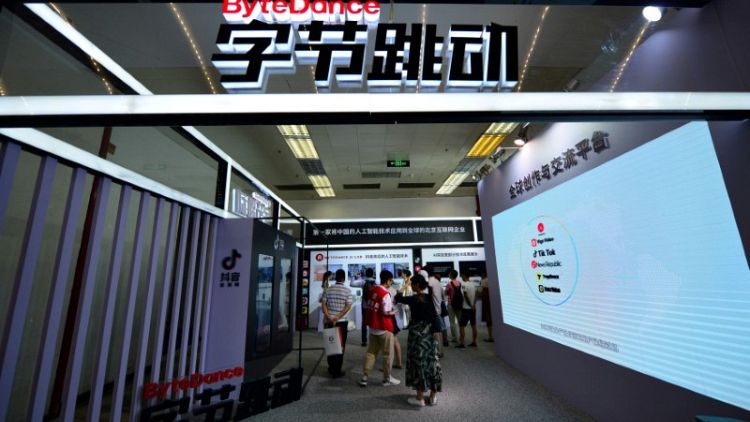By Kane Wu and Julie Zhu
HONG KONG (Reuters) - Investors are bracing for a series of “down rounds” in China’s much-hyped tech sector as weak stock markets worldwide and the country's economic slowdown weigh on once-buoyant private markets.
Falling valuations risk denting investor enthusiasm for future funding rounds - potentially limiting the amounts startups are able to raise. One senior tech-focused dealmaker estimated that targeted valuations have fallen between 20 and 40 percent in China's tech space over the last three months alone.
This week Maoyan Entertainment, China’s top movie ticketing app, became the latest example of the trend as the Hong Kong initial public offering of the group backed by Tencent Holdings Ltd valued the company at $2.16 billion (1.65 billion pounds) - more than a quarter below the valuation reached in its last 2017 funding round.
Valuations of some sizeable unicorns - startups with at least a billion-dollar valuation - have also been dropping in the more opaque market of private secondary trading, where investors trade their holdings in unlisted companies.
Stakes in China's ride-hailing champion Didi Chuxing have traded at prices implying a valuation of $40-44 billion, according to Moncef Heddad, managing partner and head of Asia at securities brokerage firm Rainmaker Asia Holdings.
Didi's valuation exceeded $65 billion after its 2018 funding round, according to two sources familiar with the company. The privately held firm had been valued at $56 billion in a 2017 fundraising. Didi declined to comment.
"Most people pay for forward-looking valuations assuming that growth will only go in one direction, but when the economy is having a downturn, these forward-looking valuations are not going to sustain and need to adjust and correct too," said Hong Kong-based Heddad.
Companies expected to seek funding in public or private markets this year include Beijing Bytedance Technology Co, owner of leading news aggregator Jinri Toutiao; artificial intelligence firms Megvii and SenseTime; and coffee startup Luckin, sources have told Reuters.
Bytedance, SenseTime and Luckin declined to comment. Megvii didn't respond to a request for comment.
Other companies have had to lower their target valuations in funding rounds, including Ping An-backed financial technology company Lufax, which closed its latest funding effort in December at a valuation of $38 billion versus a target of $40 billion.
IPO MOMENT OF TRUTH
Tech investors in China have for the last few years enjoyed soaring valuations and a far-faster pace of unicorn creation compared with other markets, including the United States
But Hong Kong's IPO markets in 2018 began to dampen the dizzying optimism as a string of hotly anticipated floats, including smartphone maker Xiaomi, priced towards the bottom end of their indicated ranges - and then fell further on trading.
Xiaomi's July IPO valued the firm at about $54 billion, or just over half the $100 billion that industry insiders had touted early in the year. Its current market cap, at around $33 billion, is also below the $46 billion valuation it reached in its last pre-IPO fundraising in 2014.
"I think it's healthy," said Joe Tsai, co-founder of Alibaba Group when asked about the effect of such down rounds at a Reuters BreakingViews event in Hong Kong last week.
"The public markets have already reflected the down round... and I expect to see that happen in the next 6-9 months in the private markets."
"I think the entrepreneurs had it too easy being able to raise gigantic billion dollar levels of capital at multi billion dollars of valuation. It's just distorted," he said.
Alibaba affiliate Ant Financial was one beneficiary of the funding boom. Last year it raised $14 billion in the world's largest single fundraising by a private company - a deal that also made the payments operator the world's largest unicorn with a valuation of $150 billion.
But even IPOs backed by Alibaba have since felt the chill: Babytree Group, a parenting website operator backed by the e-commerce giant, was valued at $1.5 billion in its $217 million November IPO in Hong Kong - down from a $2 billion valuation when Alibaba invested last May.
LESSER OF TWO EVILS
Investors concerned by the outlook have increasingly begun to demand downround protection clauses in fundraising agreements, industry sources said.
These can take different forms, but typical conditions involve a company agreeing to buy back shares, or otherwise compensate investors, if it fails to go public within a certain period or above a specified valuation.
Beijing Bytedance is one example, according to sources. The company, which also owns popular short video streaming app TikTok, raised $3 billion at a $78 billion valuation late last year.
But two sources say that at least some investment agreements for the deal included a pledge it would reach a value of at least $90 billion when it launches an IPO.
Industry participants have cautioned however that the deals may not be enforced when it comes down to it since for many late-stage investors, a down round via IPO is often a better option, despite the price, than being trapped in a still-private company.
"A down-rounded IPO isn’t good news but is more acceptable for investors because that at least offers an exit and creates market liquidity," said a senior private equity investor who focuses on tech investments. "Of the two evils, we choose the lesser."
(Reporting by Kane Wu and Julie Zhu; Editing by Jennifer Hughes and Neil Fullick)



